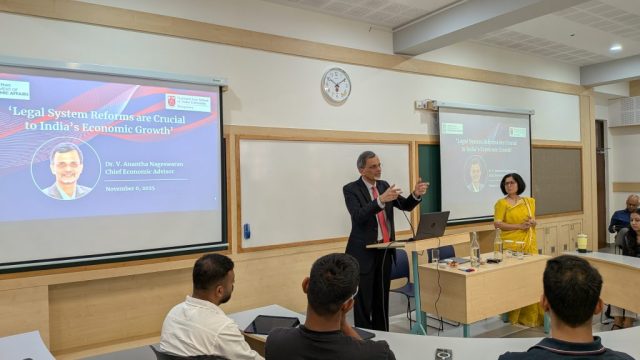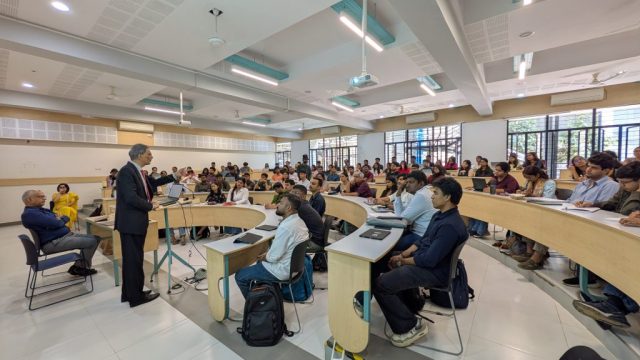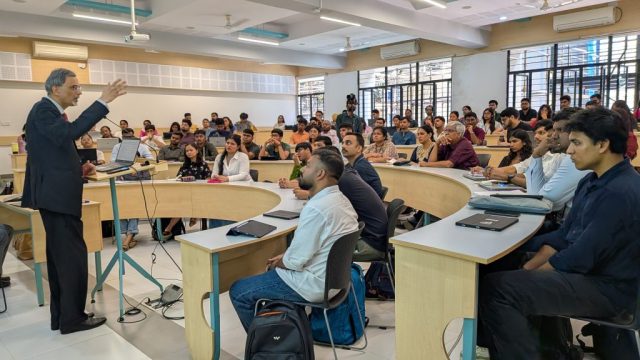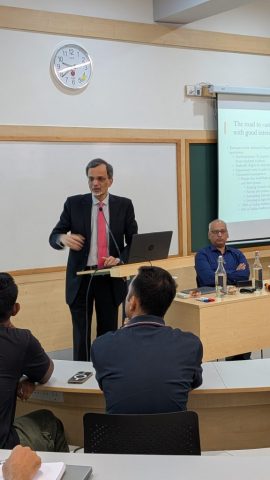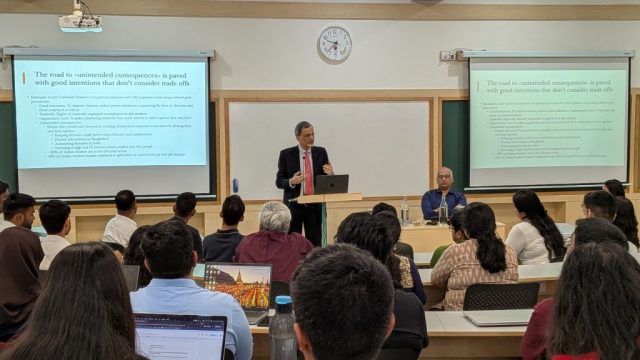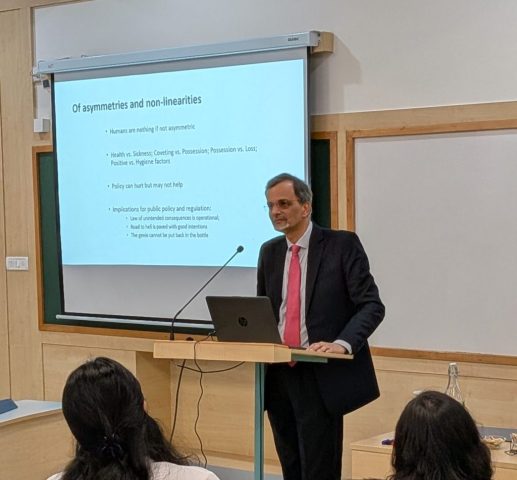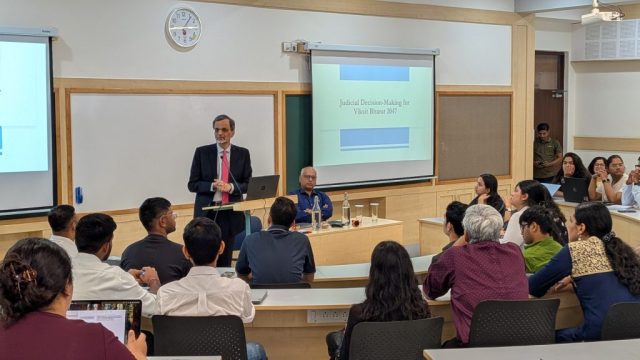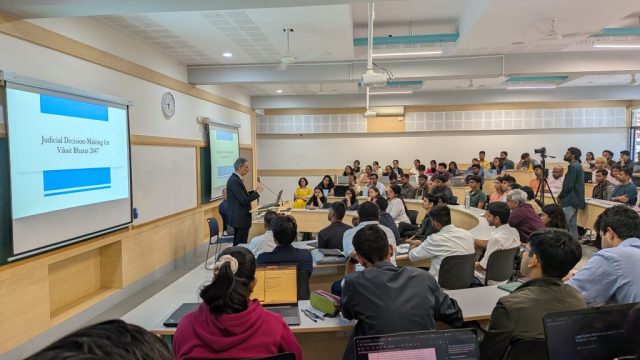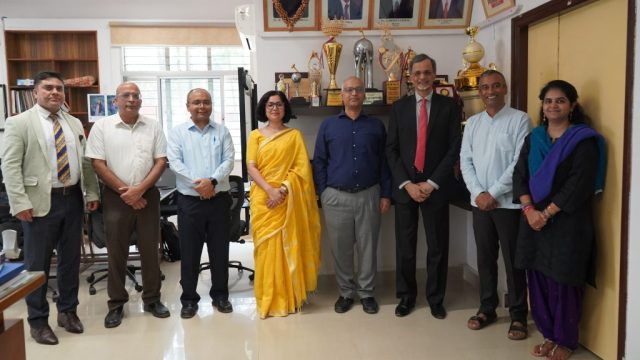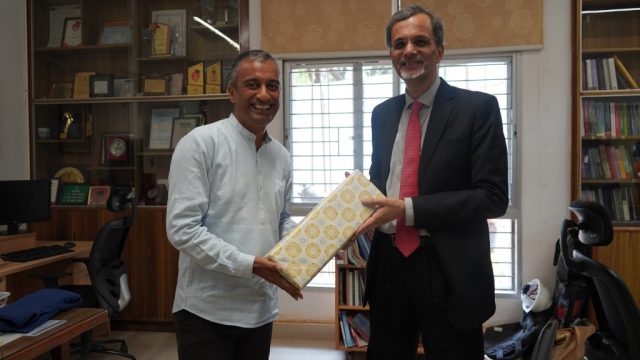Chief Economic Advisor Dr. V. Anantha Nageswaran Visits NLSIU
NAB 102
Thursday, November 6, 2025, 9:00 am
Open only to the NLS community.
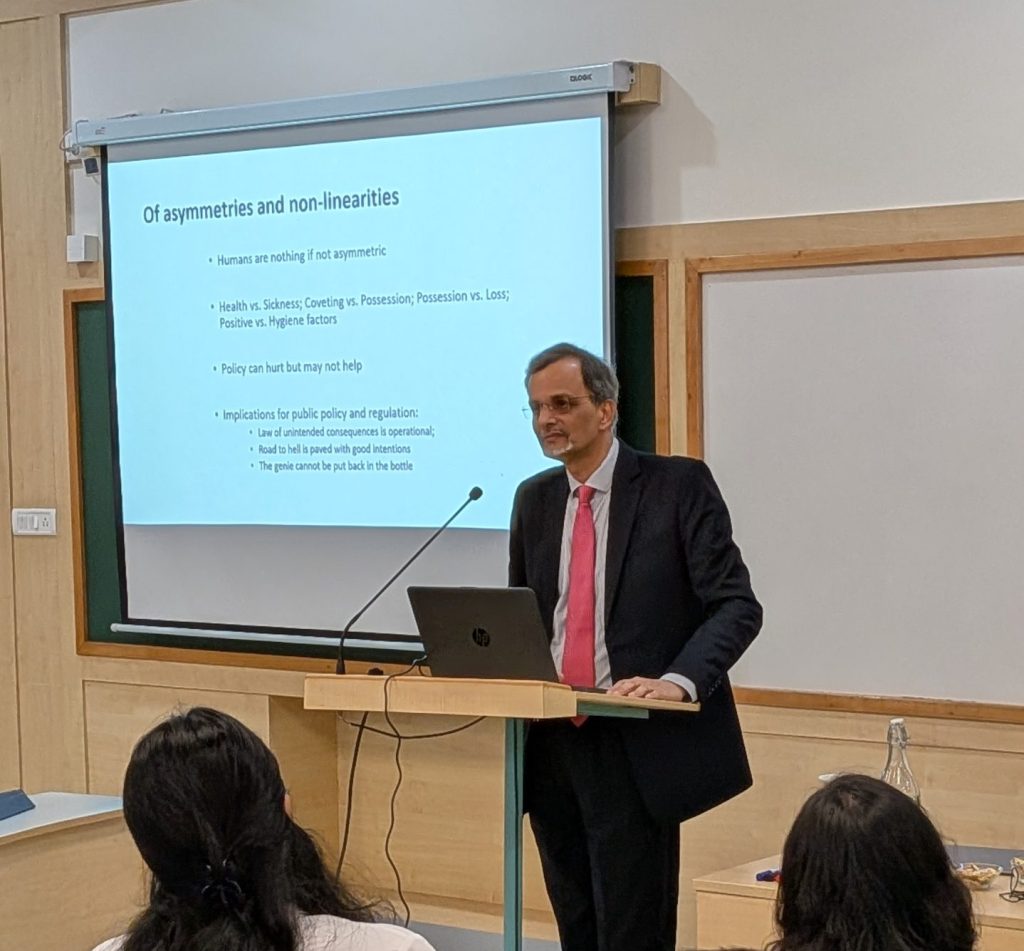
We were delighted to host Dr. V. Anantha Nageswaran, Chief Economic Advisor (CEA), Govt of India, at the NLSIU campus on November 6, 2025, where he delivered a special lecture on the topic ‘Judicial Decision-Making for Viksit Bharat 2047’.
The session was organised for the first-year Master’s Programme in Public Policy (MPP) and 3-Year LLB cohorts and was also open to the wider NLS community.
Abstract
The world economy is changing, and India has a narrow window of opportunity to grow fast and take its place within it as a major global player, which would also provide a high standard of living to its citizens. In this session, Dr. Anantha covered why the legal system must play an essential role in this process, where the lacunae exist presently especially from the perspective of economically grounded reasoning in our legal system. Specifically, Dr. Anantha covered the importance of trade-offs, opportunity costs and unintended consequences. The session also took students through the application of the lens of economic reasoning to some prominent issues.
About the Speaker
Dr. V. Anantha Nageswaran is the 18th Chief Economic Advisor to the Government of India. Before being appointed CEA, he was a writer, author, teacher and consultant. He wrote a weekly column in Mint on Tuesdays from 2007 until 2022. He has co-authored books on Derivatives, Global Finance and the Indian economy. He earned his doctoral degree from the University of Massachusetts in Amherst in 1994 for his work on exchange rate behaviour. In 1985, he received a Post-Graduate Diploma in Management from the Indian Institute of Management, Ahmedabad. He worked in macroeconomic and financial markets research for international financial institutions in Switzerland and Singapore from 1994 to 2011.
Excerpts from the Lecture
Achieving Viksit Bharat 2047 in a Changing World
Dr. Anantha spoke about how global dynamics are being transformed by supply shocks, geopolitical realignments, technological breakthroughs, and demographic shifts. In an evolving landscape, he mentioned that India has a limited but critical window of opportunity to establish itself as a major global economic power. Achieving this vision demands investment-friendly and growth-oriented regulatory institutions, he said.
At the foundation of this transformation lies a predictable, economically grounded legal system—essential to building investor confidence and accelerating progress toward the vision of ‘Viksit Bharat 2047’- the Indian government’s vision to transform India into a developed nation by the 100th anniversary of its independence in 2047.
Stating that there is enormous responsibility on policy makers, Dr. Anantha highlighted that two key qualities that are required in policy makers, lawyers and judges today are open-mindedness and humility, in the sense of being open to emperical evidence and apply post-corrective measures as may be required.
He also spoke about the concept of asymmetries and non linearities in Economics, Life, and Public Policy – highlighting how certain actions, while offering no guarantee of success, have clear asymmetrical risks. He elaborated this point with several examples during the lecture.
Economic resilience and strength
He spoke about how economic strength comes from a legal system that understands and considers economic consequences; that comes from people’s freedom to start, trade, invest, and compete under predictable rules. He also touched upon how strong legal institutions can help ensure fair processes to secure property, speedy contract enforcement, and dispute resolution; and thus a high-performing, economically informed legal framework builds trust and strong incentives for both human and physical capital formation.
No such thing as a free lunch – trade offs
“Sound economic thinking requires recognising trade-offs, opportunity costs, and unintended consequences in every decision. Every choice involves a trade-off, because nothing is truly free—there’s always a cost in time, money, effort, or opportunity,” he said, sharing examples of personal trade-offs, and legal and policy trade-offs.
One of the most important and unseen costs is the next best opportunity
He elaborated further on how every choice may involve giving up the next best alternative, which represents a real but often unseen opportunity cost. “People make decisions after considering the best options available to them but the next best alternative that you gave up is also a cost. For example, what will factory owners do if you make it very expensive to employ labourers? Is their next best alternative always to increase wages?,” he questioned, indicating that when one option becomes unviable, people may shift to their next best alternative, not necessarily the one policymakers prefer.
The road to <unintended consequences> is paved with good intentions that don’t consider trade offs
Dr. Anantha spoke how well-intended policies can backfire when they ignore trade-offs, opportunity costs, and incentives. And thus ignoring economic incentives and trade-offs can also turn good intentions into barriers to growth and inclusion.
Taking the example of The Industrial Disputes Act which requires government permission for factories with over 100 workers to dismiss employees, he explained the intentions, trade offs and the consequences that could arise.
Interactions on Campus
After concluding his talk, Dr. Anantha interacted with members of the University including – NLSIU Vice-Chancellor Prof. (Dr.) Sudhir Krishnaswamy, Registrar In-Charge, Prof. (Dr.) N S Nigam, MPP Chair Dr. Srikrishna Ayyangar, MPP faculty Dr. Sneha Thapliyal, Dean-Academics & Associate Professor of Law Dr. Saurabh Chatterjee, and Director – Communications & External Relations, Ms. Deepti Soni.


